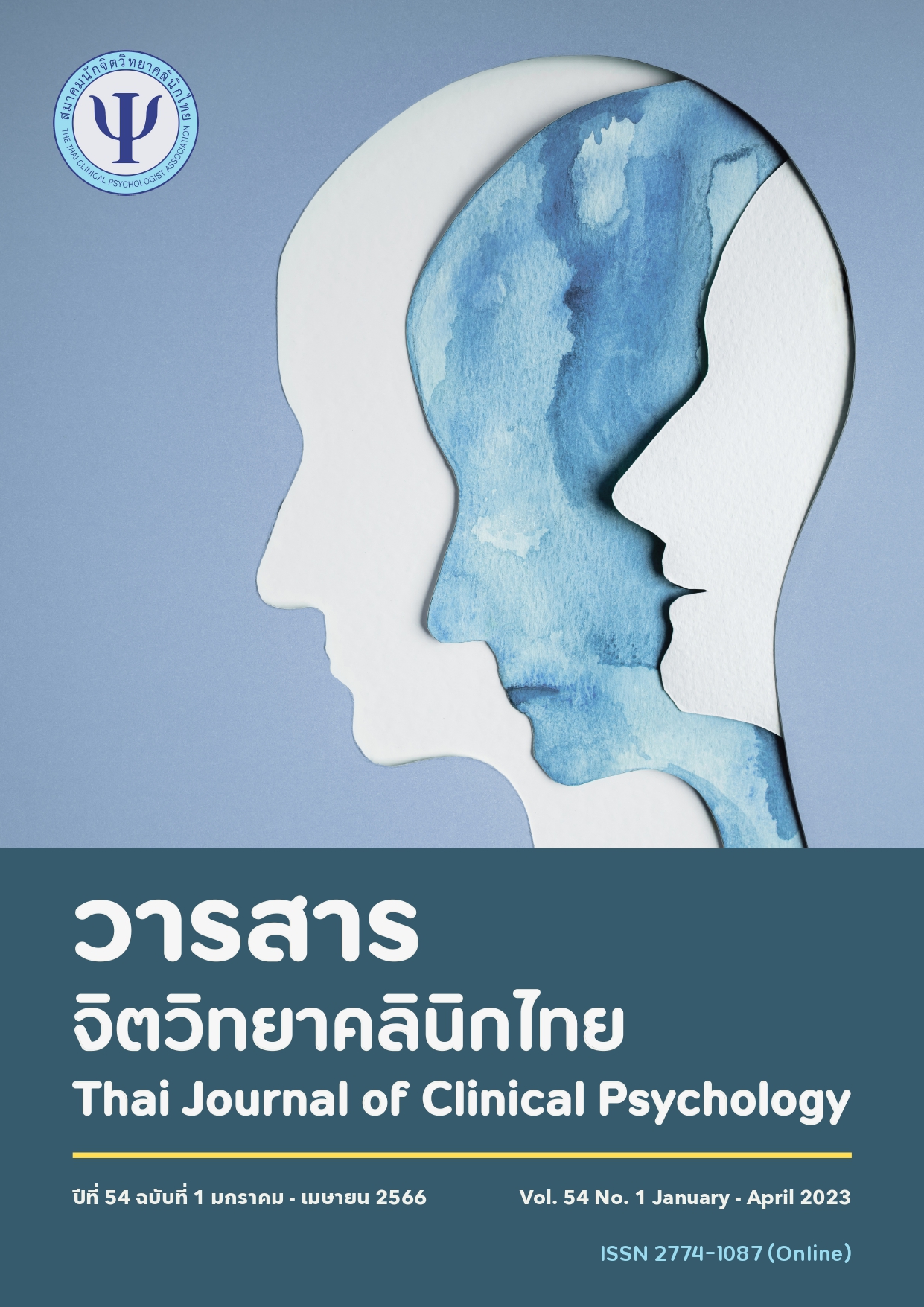การพัฒนาความจำขณะปฏิบัติงานผ่านกิจกรรมเกมกระดานในเด็กวัยเรียน
Main Article Content
บทคัดย่อ
วัตถุประสงค์ เพื่อพัฒนาเกมกระดานที่มีประสิทธิภาพในการพัฒนาความจำขณะปฏิบัติงานด้านการมองเห็นและมิติสัมพันธ์และด้านภาษาของเด็กวัยเรียน โดยเปรียบเทียบความจำขณะปฏิบัติงานระหว่างกลุ่มทดลองกับกลุ่มควบคุม และระหว่างก่อนกับหลังการทดลอง วัสดุและวิธีการ กลุ่มตัวอย่าง เป็นเด็กวัยเรียนจำนวน 30 คน ที่กำลังศึกษาระดับประถมศึกษาปีที่ 5 และ 6 ภาคเรียนที่ 1 ปีการศึกษา 2564 โรงเรียนชุมชนแห่งหนึ่ง จังหวัดนนทบุรี แบ่งเป็นกลุ่มทดลองและกลุ่มควบคุม กลุ่มละ 15 คน โดยกลุ่มทดลองเข้าร่วมกิจกรรมเกมกระดานที่ผู้วิจัยพัฒนาขึ้นเป็นเวลา 4 สัปดาห์ สัปดาห์ละ 2 ครั้ง ครั้งละ 1 ชั่วโมง รวมทั้งสิ้น 8 ครั้ง ขณะที่กลุ่มควบคุมดำเนินกิจวัตรประจำวันของโรงเรียนตามปกติ เครื่องมือวิจัยได้แก่ แบบสอบถามข้อมูลทั่วไป กิจกรรมสมมาตร (symmetry span) เพื่อประเมินความจำขณะปฏิบัติงานด้านการมองเห็นและมิติสัมพันธ์และโปรแกรมคอมพิวเตอร์ประเมินสมรรถนะความจำขณะคิดด้านภาษาเพื่อประเมินความจำขณะปฏิบัติงานด้านภาษา โดยใช้สถิติความถี่ ร้อยละ และการทดสอบที ผล พบว่า กลุ่มทดลองเกมกระดานมีคะแนนเฉลี่ยความจำขณะปฏิบัติงาน ด้านการมองเห็นและมิติสัมพันธ์ ด้านภาษา และด้านผลรวมสูงกว่ากลุ่มควบคุมอย่างมีนัยสำคัญทางสถิติที่ระดับ .05 ขณะเดียวกันในกลุ่มทดลอง พบว่าคะแนนเฉลี่ยความจำขณะปฏิบัติงานด้านการมองเห็นและมิติสัมพันธ์ ด้านภาษา และด้านผลรวมสูงกว่าก่อนทดลองอย่างมีนัยสำคัญทางสถิติที่ระดับ .05 สรุป เกมกระดานที่ถูกพัฒนาขึ้นครั้งนี้ มีประสิทธิภาพในการพัฒนาความจำขณะปฏิบัติงานด้านการมองเห็นและมิติสัมพันธ์ และภาษาในเด็กวัยเรียนได้ ควรทำความเข้าใจเกมกระดานก่อนนำไปใช้และควรมีการศึกษาเพิ่มเติมปัจจัยส่วนบุคคลที่มีผลต่อความจำขณะปฏิบัติงาน
Article Details

อนุญาตภายใต้เงื่อนไข Creative Commons Attribution-NonCommercial-NoDerivatives 4.0 International License.
เรื่องที่ลงตีพิมพ์ในวารสารจิตวิทยาคลินิกแล้วถือเป็นลิขสิทธิ์การเผยแพร่โดยวารสารจิตวิทยาคลินิกแต่เพียงผู้เดียว การตีพิมพ์หรือเผยแพร่ซ้ำในที่อื่นต้องได้รับอนุญาตจากกองบรรณาธิการวารสารฯ
เอกสารอ้างอิง
Alloway, T. P., & Gathercole, S. E. (2007). Understanding working memory: A classroom guide. Harcourt Assessment.
Baddeley, A. (1999). Essential of human memory. Psychology Press.
Baddeley, A., Eysenck, M. W., & Anderson, M. C. (2015). Memory (2nd ed.). Psychology Press.
Chatsupakul, K. (2003). School group activities (5th ed.). Srinakharinwirot University Book Center. (in Thai).
Chooi, W. T. (2012). Working memory and Intelligence: A brief review. Journal of Education and Development Psychology, 2(2), 42 – 50.
Dachachote, K., & Sukun, Z. (2018, August 20 - 21). The uses of games in education with purpose of improving Chinese vocabulary memorizing skill beneficial for hospitality business services [Poster presentation]. The 1st National Conference on Humanities and Social Sciences: Wisdom Power for Sustainable Development, Songkhla, Thailand.
Dahlin, K. I. E. (2011). Effects of working memory training on reading in children with special needs. Read Writ, 24, 479–491. https://doi.org/10.1007/s11145-010-9238-y
Engle, R. W., Tuholski, S. W., Laughlin, J. E., & Conway, A. R. A. (1999). Working memory, short-term memory, and general fluid intelligence: A latent-variable approach. Journal of Experimental Psychology: General, 128(3), 309–331. https://doi.org/10.1037/0096-3445.128.3.309
Foster, J., Shipstead, Z., Harrison, T. L., Hicks, K. L., Redick, T. S., & Engle, R. W. (2015). Shortened complex span tasks can reliability measure working memory capacity. Memory cognition, 43, 226-236. https://doi.org/10.3758/s13421-014-0461-7
Fukuda, K., Vogel, E., Mayr, U., & Awh, E. (2010). Quantity not quality: The relationship fluid intelligence and working memory capacity. Psychonomic Bulletin & Review, 17(5), 637-679.
Gobet, F., de Voogt, A., & Retschitzki, J. (2004). Move in mind: The Psychology of Board games. Psychology press.
Holmes, J., & Gathercole, S. E. (2014). Taking working memory training from laboratory into school. Educational Psychology, 34(4), 440 – 450.
Kane, M. J., Hambrick, D. Z., Tuholski, S. W., Wilhelm, O., Payne, T. W., & Engle, R. W. (2004). The generality of working memory capacity: A latent - variable approach to verbal and visuospatial memory span and reasoning. Journal of Experimental Psychology: General, 133(2), 189–217. https://doi.org/10.1037/0096-3445.133.2.189
Klingberg, T. (2010). Training and plasticity of working memory. Trends in Cognitive Sciences, 14, 317-324.
Klinwichit, P., Wisessathorn, M., & Hongyantarachai, T. (2019). Effects of visuospatial working memory training in the elderly. Burapha Journal of Medicine, 6(2), 28 – 44. (in Thai).
Lin, C.- H., Chen, C.-M., & Lou, Y.- C. (2014). Developing spatial orientation and spatial memory with a treasure hunting Game. Educational Technology & Society, 17(3), 79 – 92.
Melby-Lervåg, M., & Hulme, C. (2013). Is working memory training effective? A meta-analytic review. Developmental Psychology, 49(2), 270–291. https://doi.org/10.1037/a0028228
Morrison, A. B., & Chein, J. M. (2011). Does working memory training work? The promise and challenges of enhancing cognition by training working memory. Psychon Bull Rev, 18, 46–60. https://doi.org/10.3758/s13423-010-0034-0
Opasanon, N., & Prayoonsak, S. (2022). The development of the working memory boardgame in accordance with the Multi-component model in child and adolescent. Thai Journal of Clinical Psychology, 53(2), 49-63. (in Thai).
Phinitkit, S., Sripunvoraskul, S., & Panthong, K. (2015). Development of computer program for phonological working memory capacity assessment of upper secondary school students. Research Methodology & Cognitive Science, 13(2), 71 - 89. (in Thai).
Preedakorn, A. (2014). Design a boardgame to study colour circle for student in grade 6. [Unpublished of Master’s thesis]. Srinakarinwirot University. (in Thai).
Puttarangsi, R., (2019). Application of board games for performing arts communication skill development [Unpublished master’s thesis]. Chulalongkorn University. (in Thai).
Salthouse, T. A., & Pink, J. E. (2008). Why working memory related to fluid intelligence?. Psychonomic Bulletin & Review, 15(2), 364-371.
Skelton, R., & Atkinson, C. (2017). Increasing children’s working memory capacity: Preliminary evaluation of a card-based programme. Educational Psychology Research and Practice, 3(2), 19-35.
Stone, J. M., & Towse, J. N. (2015). A Working Memory Test Battery: Java-Based Collection of Seven Working Memory Tasks. Journal of open Research Software, 3(e5), 1-9. http://dx.doi.org/10.5334/jors.br
Taspinar, B., Schmidt, W., & Schuhbauer, H. (2016). Gamification in education: Board game approach to knowledge acquisition. Procedia Computer Science, 99(2016), 101-116.
Tinsman, B. (2008). The Game inventor’s guidebook. Morgan James Publishing.


